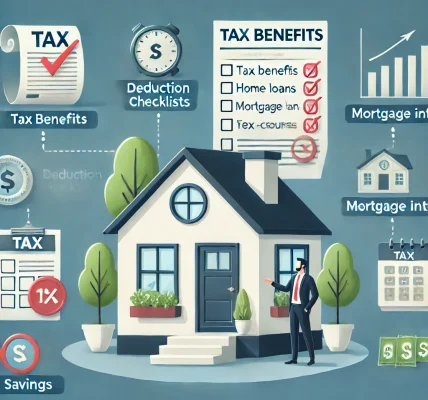Introduction
Freelancers and gig workers often struggle with tax planning since they do not have the structured benefits of salaried employees. However, with proper knowledge of tax laws, freelancers can significantly reduce their tax liability and maximize savings. This guide covers essential tax benefits, deductions, and strategies that every freelancer should know while ensuring full compliance with tax regulations.
1. Understanding Your Tax Obligations as a Freelancer
Freelancers are considered self-employed professionals under tax laws. Unlike salaried employees, they are responsible for:
- Paying income tax on earnings
- Maintaining records of income and expenses
- Filing an Income Tax Return (ITR) annually
- Paying Goods and Services Tax (GST) if applicable
2. Choosing the Right Tax Regime: Old vs. New
Freelancers can opt for either:
- Old Tax Regime: Allows multiple deductions and exemptions but has higher tax rates.
- New Tax Regime: Offers lower tax rates but eliminates most deductions.
Choosing the best regime depends on the deductions you can claim. If you have significant business expenses and investments, the old regime is often beneficial.
3. Deductible Business Expenses
Freelancers can reduce taxable income by deducting legitimate business expenses, such as:
- Office Rent & Co-working Space Fees
- Internet & Mobile Bills
- Software & Subscriptions (e.g., Adobe, Microsoft Office, Zoom, etc.)
- Office Supplies & Equipment
- Marketing & Advertising Costs
- Professional Fees (CA, Legal, Consultant Fees, etc.)
- Travel Expenses for Business Meetings
- Training & Skill Development Courses
Maintaining invoices and receipts for these expenses is crucial for tax filing and audits.
4. Presumptive Taxation Scheme Under Section 44ADA
Freelancers offering professional services can opt for the Presumptive Taxation Scheme (PTS) under Section 44ADA, which simplifies tax calculations. Key benefits include:
- Only 50% of total gross receipts are taxable, assuming the rest covers expenses.
- No need to maintain detailed books of accounts if opting for PTS.
- Applicable for freelancers earning up to ₹50 lakh per year.
5. GST for Freelancers: When and How to Register
Freelancers providing services must register for Goods and Services Tax (GST) if:
- Annual income exceeds ₹20 lakh (for services) or ₹40 lakh (for goods).
- They work with international clients (Export of Services).
- They provide taxable services to GST-registered businesses.
If GST applies, freelancers must:
- Charge 18% GST on invoices.
- File GST returns (monthly/quarterly).
- Claim Input Tax Credit (ITC) on business expenses.
6. Tax Deductions Available for Freelancers
Freelancers can claim various deductions under the Income Tax Act:
- Section 80C: Investments in EPF, PPF, ELSS, Life Insurance, NSC (Limit: ₹1.5 lakh).
- Section 80D: Health insurance premiums (₹25,000 for self, ₹50,000 for senior citizens).
- Section 80E: Education loan interest deduction.
- Section 80G: Donations to registered charities.
- Section 80TTA/80TTB: Deduction on interest from savings accounts (₹10,000/₹50,000 for senior citizens).
7. Depreciation on Assets
Freelancers who purchase laptops, cameras, printers, office furniture, or other business-related assets can claim depreciation on their taxable income. The depreciation rates vary based on the asset type, allowing freelancers to lower their tax burden.
8. Home Office Deduction
If you work from home, you can deduct a portion of:
- Rent or home loan interest
- Utility bills (electricity, water, internet)
- Office furniture and equipment
Ensure proper documentation to validate these deductions.
9. Advance Tax Payment to Avoid Penalties
Freelancers must pay Advance Tax if their total tax liability exceeds ₹10,000 in a financial year. The due dates are:
- June 15 – 15% of estimated tax
- September 15 – 45% of estimated tax
- December 15 – 75% of estimated tax
- March 15 – 100% of estimated tax
Failure to pay advance tax results in interest penalties under Section 234B & 234C.
10. Claiming Foreign Income Exemption
If you work with international clients, you may qualify for:
- Tax exemption on foreign income under Double Taxation Avoidance Agreement (DTAA).
- Foreign Remittance Exemptions when receiving payments via PayPal, Wire Transfer, etc.
Ensure you have Foreign Inward Remittance Certificates (FIRC) for compliance.
11. Filing Income Tax Return (ITR) for Freelancers
Freelancers should file ITR-3 or ITR-4 (if opting for presumptive taxation).
- Keep records of income, invoices, and expenses.
- Ensure TDS deductions are correctly credited.
- Use online portals or consult a CA for accurate tax filing.
12. Maintaining Proper Documentation
Freelancers must maintain financial records such as:
- Invoices & Receipts for services provided.
- Expense Records with bills and payment proof.
- Bank Statements & Tax Payment Receipts.
- Contracts with Clients for clarity on payments.
Maintaining clear financial records helps avoid tax disputes and audits.
13. Consulting a Tax Professional for Best Advice
While DIY tax planning is possible, consulting a Chartered Accountant (CA) or tax expert helps:
- Optimize tax savings
- Ensure compliance with tax laws
- Avoid legal issues or tax penalties
Conclusion
Freelancers can reduce their tax burden legally by leveraging tax deductions, choosing the right tax regime, and maintaining proper financial records. Understanding GST, presumptive taxation, advance tax payments, and expense deductions ensures better financial planning and compliance.
By implementing these strategies, freelancers can enjoy higher tax savings while staying legally compliant. Always keep updated with tax laws and seek professional guidance when necessary.




